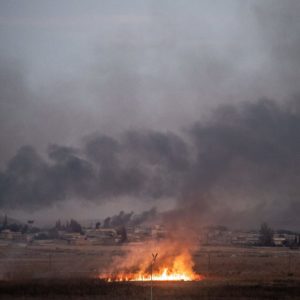
I’m often asked why I study religion. To those asking, my decision usually registers as vaguely interesting, if a bit niche, but certainly not as very “practical.” Often such conversations prompt inquiry into my own religious life—as if one could only study religion out of personal piety or an ascetic willingness to forego the earning potential of an economics or computer science degree. Temperamentally inclined to charitable conversation as I am, I try not to take misunderstandings or dismissals of what I do too seriously. As other humanities students likely know, being on the receiving end of such attitudes come with the disciplinary territory.
But my experiences with fielding questions about religious studies have been useful in another respect, as anecdotal confirmation of what research consistently bears out: many people, especially Americans, know very little about religion. According to a recent Pew Research Center study, a full 62% of respondents to a national poll earned a score of 50% or less on a multiple choice quiz of basic doctrines across several religious traditions. When one considers that religious knowledge (or the lack thereof) is correlated with feelings of affinity or aversion toward a given religion, this degree of religious ignorance in our society should invite serious pause, if not mild alarm.
Unfortunately, widespread misunderstandings of religion in the traditional sense—pertaining to beliefs, rituals, places and modes of worship, theology and doctrine, and so forth—are only the beginning of the problem. Failing to apprehend even the obviously “religious” blinds us to the subtler workings of certain dynamics all around (and within) us that the study of religion can elucidate. In my view, this is where some of the most interesting religious studies scholarship is being (and remains to be) done. (For any potential Religion majors out there, keep this in mind–religious studies is a big tent, allowing you the possibility to work on many different kinds of scholarly subjects.)
Crucially, this new scholarship goes “beyond” religion in the ordinary, everyday sense of the word. In his fascinating article “Otherworldly” States: Reimagining the Study of (Civil) “Religion”, C. Travis Webb introduces the expansive category of otherworldliness, defined as “a subject or social network’s orientation towards a ‘world’ that would cease to exist without that orientation.” As he demonstrates, “the Platonic world of forms, historical periodization, race, inalienable rights, not to mention the more obvious ‘religious’ and less obvious ‘secular’ typologies, are all otherworldly.” That is, without particular individual and collective understandings of and orientations toward these things, they would disappear. Yet, appear they very much do, prompting a host of questions as to why, how, and to what end. These are some of the questions that are currently guiding my own Senior Thesis research into the possible otherworldly origins of religious and political polarization.
Where is otherworldliness in our world? Examples range from President Donald Trump’s imagined “Great America” of the past to the climate eschatology behind certain calls for a “Green New Deal.” (Or, closer to home, consider the widespread perception of Princeton’s prestige driving ever-increasing application numbers.) The momentum behind these otherworldly discursive movements underscores the salience of investigating the mechanics and dynamics of “otherworldliness” today. This is a task for scholars of religion, and more broadly, for anyone attuned to the workings of the imagination. We ignore the fierce debates over the otherworldly at our own peril, for how we situate ourselves imaginatively within “otherworlds” (in the course of history, in national and social relations, etc.) informs the very real choices we make in this one, the “real world” of flesh and blood and earth.
Indeed, the concrete consequences emanating from our imagined otherworlds can be dire. If nations are imagined communities, as Benedict Anderson has persuasively argued, the way in which they are imagined—the content of the national imaginary—can steer the nation toward peace or war. A concrete example: Several days ago, Turkey invaded northern Syria. I’m told by a friend closely monitoring the situation that as the first brigade of Turkish tanks rolled across the border, they did so with flags waving and patriotic songs blaring. Such activities are designed to provoke feelings of righteousness and confidence in the hearts and minds of the men sent on behalf of the state to destroy “the enemy” (another otherworldly category). As this unfolding tragedy demonstrates, the modern media of nationalism pair all too well with the historically familiar human spirit of militarism. Beneath it all, insidious imagination runs.
Sure, the humanities sometimes earn their rap for being light and fluffy, the stuff of poetics and the sublime and all that. Fine. But ideas, in their interplay with human thought and action, are serious business. Humanistic scholars are well equipped to discuss this, and they should. That is why I study religion, and that is why—jokes about the difficulties of the job market aside—I urge others to think twice before dismissing this sphere of scholarly activity as frivolous. In our deeply divided yet ever more interconnected world, the stakes are simply too high.
–Shanon FitzGerald, Humanities Correspondent

